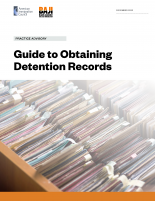- Practice Advisories
A Guide to Obtaining Detention Records
Published
Individuals held in immigration detention facilities have a right to government records about their detention. Those records can help detained or formerly detained people learn more about what happened to them when they were detained and what they experienced, including abusive treatment, difficulty accessing an attorney, and lack of medical care. These government records also may support a legal claim or complaint against the agency that detained the individuals and can help advocates working for changes in the immigration detention system.
One way to obtain government information about immigration detention is through a Freedom of Information Act (FOIA) request to a government agency. Among the agencies that possess detention records are U.S. Immigration and Customs Enforcement (ICE) and U.S. Customs and Border Protection (CBP)—agencies within the U.S. Department of Homeland Security (DHS). Government agencies like ICE and CBP must follow certain rules under FOIA. After a person submits a FOIA, the agencies must respond to the request within a certain amount of time, conduct a reasonable search for the documents, and share those documents with the FOIA “requester.”
The process for obtaining detention-related information, however, is not always straightforward. This guide provides (1) a brief overview of FOIA requirements, (2) information about the types of records government agencies possess, (3) tips about how to request those records, and (4) an overview of what to expect after submitting the request.
This guide was created in partnership with the Black Alliance for Just Immigration (BAJI).

